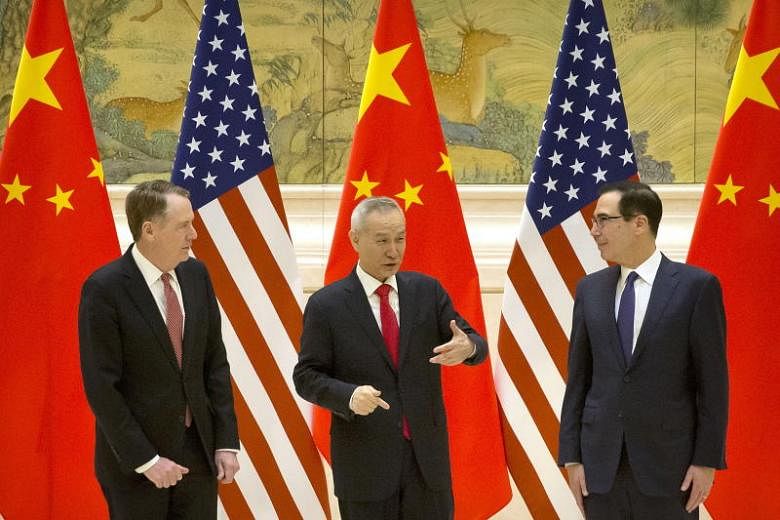BEIJING/WASHINGTON (REUTERS) - China has pledged to end market-distorting subsidies for its domestic industries but offered no details on how it would achieve that goal, according to three people familiar with the United States-China trade talks in Beijing this week.
China promised to bring all subsidy programmes into compliance with World Trade Organisation (WTO) rules, the sources said, but US negotiators reacted sceptically, in part because China has long refused to disclose its subsidies.
Without knowing exactly how the Chinese government finances industries and state-run companies, any reform promises would be difficult to enforce, said the sources, speaking on condition of anonymity because the negotiations are confidential.
The sticking point between the world's two largest economies illustrates a core challenge in ending their seven-month trade war: Ensuring China's pledges will translate into concrete action.
In four days of talks this week in Beijing, progress has been difficult on US demands for structural reforms, according to one of the sources briefed on the talks. In addition to curbs on state subsidies, US negotiators are seeking measures to end the forced transfer of US technology to Chinese firms and cyber theft of American trade secrets.
Spokespersons for the US Trade Representative's office and the US Treasury did not immediately respond on Thursday (Feb 14) to requests for comment about the talks. China's Commerce Ministry did not respond to a faxed request for comment.
The latest round of negotiations are expected to conclude on Friday with a meeting between Chinese President Xi Jinping and the top two US negotiators, Trade Representative Robert Lighthizer and Treasury Secretary Steven Mnuchin.
If the two sides cannot reach a deal by March 1, US tariffs on US$200 billion (S$271 billion) worth of Chinese goods are scheduled to rise to 25 per cent from 10 per cent.
Curbing China's state subsidies is a priority in the trade talks for Mr Lighthizer, who has warned that America will have a sharply diminished economic future if China is allowed to continue its industrial policies and supplant US dominance in high-technology industries.
Since China joined the WTO in 2001, it has failed in its obligations to report state subsidies, another of the sources briefed on recent trade talks said.
"What they offered to do was to actually take it seriously,"the source said of China's recent promise to comply with those WTO requirements.
US negotiators remain unconvinced, the source said.
"The Chinese are looking for ways to check the box and say 'We are addressing your subsidy and industrial policy questions', without changing their system," the person added.
A Chinese source briefed on the talks said that a general commitment by Beijing to make its subsidies WTO compliant was one feasible outcome of talks. But China does not keep a complete tally of all of its subsidies, the person said, making it unlikely that Chinese officials would agree to disclose a full list.
The US and other Western economies have long complained to the WTO about China's lack of transparency on industrial subsidies, which they contend give Chinese companies an unfair advantage and lead to overproduction of goods that are dumped into world markets. The government finances companies in many ways, including state-directed lending, direct investments, tax breaks and local government incentives.
The US, Japan and the European Union last year proposed that the WTO crack down on countries that fail to report subsidies that give domestic firms an advantage, a move that has gained followers including Argentina.
"The Chinese have provided no accounting of what everyone knows are massive, massive state subsidies, including through the largest state banking sector on the planet," said one of the sources familiar with this week's talks.
"Chinese subsidies are constructed to obscure and obfuscate."

